
The Spiel des Jahres is an award for board and card games, created in 1978 with the purpose of rewarding family-friendly game design, and promoting excellent games in the German market. It is thought that the existence and popularity of the award was one of the major drivers of the quality of games coming out of Germany, particularly in the 1980s and 1990s. A Spiel des Jahres nomination can increase the typical sales of a game from 500–3,000 copies to around 10,000, and the winner can usually expect to sell as many as 500,000 copies.

Reiner Knizia is a prolific German-style board game designer. He was born in West Germany in 1957 and earned a doctorate in Mathematics from the University of Ulm before designing games full time. He is frequently included on lists of the greatest game designers of all time. Many of his hundreds of designs are considered modern classics, and many have won or been nominated for significant gaming awards, including the Spiel des Jahres and the Deutscher Spiele Preis. His notable designs include Amun-Re, Blue Moon City, Ingenious, Keltis, Lord of the Rings, Medici, Modern Art, Ra, Taj Mahal, Tigris and Euphrates, and Through the Desert. Many of his designs incorporate mathematical principles, such as his repeated use of auction mechanics.

El Grande is a German-style board game for 2-5 players, designed by Wolfgang Kramer and Richard Ulrich, and published in 1995 by Hans im Glück in German, by Rio Grande Games in English, and by 999 Games in Dutch. The game board represents renaissance-era Spain where the nobility fight for control of the nine regions. El Grande was praised for its area-control mechanism, and was awarded the Spiel des Jahres prize and the Deutscher Spiele Preis in 1996. Following its release, several expansions and an alternative version were published.

Railway Rivals is a railroad-themed board game that was originally published by Rostherne Games in 1973. A German language edition was released by Bütehorn in 1979, and a mass-market edition in the UK by Games Workshop in 1985. The game involves railway building and operations.
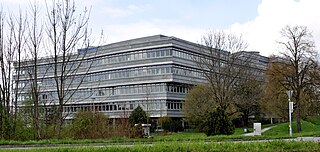
Ravensburger AG is a German game, puzzle and toy company, publishing house, and market leader in the jigsaw puzzle market.
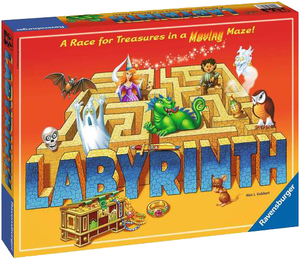
Labyrinth is a board game for two to four players, published by Ravensburger in 1986.

Hare and Tortoise is a Eurogame designed by David Parlett in 1974 and first published by Intellect Games. In 1978 it was released by Ravensburger in Germany, and received generally positive reviews critically and won the 1979 Spiel des Jahres. It has since sold some 2 million units in at least ten languages. The current editions are published by Gibsons Games in the UK, Ravensburger in Germany and Rio Grande Games in the United States.

Alan R. Moon is an author of board games, born in Southampton, England. He is generally considered to be one of the foremost designers of German-style board games. Many of his games can be seen as board game variations on the travelling salesman problem.
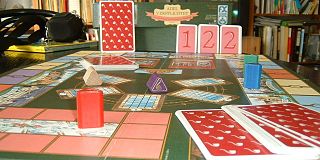
Hoity Toity is a board game created by Klaus Teuber in 1990.

Wiener Spielkartenfabrik Ferd. Piatnik & Söhne, commonly referred to as Piatnik, is an Austrian playing card and board game manufacturing company based in Vienna.

Auf Achse is a logistics-themed board game designed by Wolfgang Kramer and published in 1987 by FX Schmid. The game won the Spiel des Jahres award. In 1992, a junior edition was released; and in 1994 a rummy-like card game spinoff was released. In 2007 a revised edition was published by Schmidt Spiele.

Cego is a Tarot card game for three or four players played mainly in and around the Black Forest region of Germany. It was probably derived from the three-player Badenese game of Dreierles when soldiers deployed from the Iberian Peninsula during the Napoleonic Wars and, based on a Spanish game they had encountered, introduced Cego's distinctive feature: a concealed hand, or blind. Cego has experienced a revival in recent years, being seen as part of the culture of the Black Forest and surrounding region. It has been called the national game of Baden and described as a "family classic".
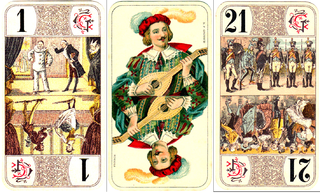
The Bourgeois Tarot deck is a mid-19th century pattern of tarot cards of German origin that is used for playing card games in western Europe and Canada. It is not designed for divinatory purposes. This deck is most commonly found in France, Belgian Wallonia, Swiss Romandy and the Canadian province of Québec for playing French Tarot; in southwest Germany for playing Cego and Dreierles; and in Denmark for Danish Tarok.

German-suited playing cards are a very common style of traditional playing card used in many parts of Central Europe characterised by 32- or 36-card packs with the suits of Acorns, Leaves, Hearts and Bells. The German suit system is one of the oldest, becoming standard around 1450 and, a few decades later, influencing the design of the now international French suit system of Clubs, Spades, Hearts and Diamonds. Today German-suited playing cards are common in south and east Germany, Austria, German-speaking Switzerland, Liechtenstein, north Italy, Hungary, Czech Republic, Slovakia, Slovenia, Croatia, Bosnia, northern Serbia, southern Poland and central and western Romania.

Brandeln is an historical card game for three or four players; in which the winning bidder plays alone against the rest. It is one of the earliest games to use the terms Bettel – a contract to lose every trick – and Mord - a contract to win every trick. One of several card games mastered by Mozart, Brandeln is still current in Austria and Germany today. It has been described as having a "civilized, refined and ingenious character" and "one of the most pleasant card games".

ASS Altenburger is since 2003 the trademark of the German playing card manufacturer Spielkartenfabrik Altenburg, based in the town of Altenburg. The firm is owned by Cartamundi, of Turnhout, Belgium. ASS claims to be the market leader in Germany for playing cards. Every year almost 40 million packs of cards of many different types are manufactured in Altenburg.
The tabletop game industry is the economic sector involved in the development, marketing, and monetization of games that fall within the scope of tabletop games, which includes dice and card games. According to Statista, the tabletop game industry had an estimated market of approximately 7.2 billion U.S. dollars in 2017 and is expected to increase by 4.8 billion U.S. dollars within the next 6 years.

Nürnberger-Spielkarten-Verlag (NSV) is a German playing card manufacturer and board game publisher based in Nuremberg. It was founded in 1989 after outsourcing from the publishing house of F.X. Schmid and builds on the "Heinrich Schwarz Playing Card Factory, Nuremberg" founded in 1948. The company produces playing cards and dice games s and, especially in recent years, increasingly proprietary games from various game authors.
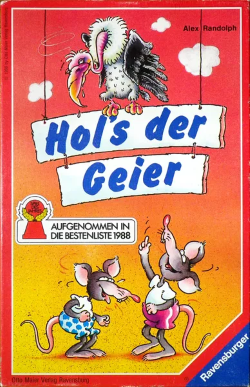
What the Heck? is the North American title of a card game originally designed by Alex Randolph and published in Germany in 1988 by Ravensburger under the title Hol's der Geier. The game has subsequently been marketed in a number of countries under various titles.
Breakaway Rider is a board game published in 1963 by F.X. Schmid.


















